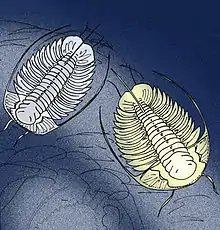Balnibarbi (trilobite)
Balnibarbi is an extinct genus of trilobites in the family Olenidae. They are known from fossils excavated in Norway. They lived during the early part of the Arenig stage of the Ordovician Period, a faunal stage that occurred about 479 to 472 million years ago.[2]
| Balnibarbi | |
|---|---|
 | |
| B. pulvurea, and B. erugata | |
| Scientific classification | |
| Kingdom: | |
| Phylum: | |
| Class: | |
| Order: | |
| Family: | |
| Genus: | Balnibarbi Fortey, 1974 |
| Species | |
|
see text | |
The genus is ancestral to, and co-existed sympatrically with, the better-known Cloacaspis.[3]
It was named for the fictional country of Balnibarbi featured in Gulliver's Travels, a place "populated by eccentric natural philosophers."[3]
Species include:[2]
- Balnibarbi ceryx
- Balnibarbi erugata
- Balnibarbi pulvurea
- Balnibarbi scimitar
- Balnibarbi sombrero
- Balnibarbi tholia
References
- Sepkoski, J. (2002). "A compendium of fossil marine animal genera (Trilobita entry)". Bulletins of American Paleontology. 364: 560. Archived from the original on September 5, 2006. Retrieved 2008-01-12.
- Balnibarbi. Fossilworks.
- Fortey, R. A. 1974. The Ordovician trilobites of Spitsbergen. I. Olenidae. Norsk Polarinstitutt Skrifter 160, 1-129.
This article is issued from Wikipedia. The text is licensed under Creative Commons - Attribution - Sharealike. Additional terms may apply for the media files.